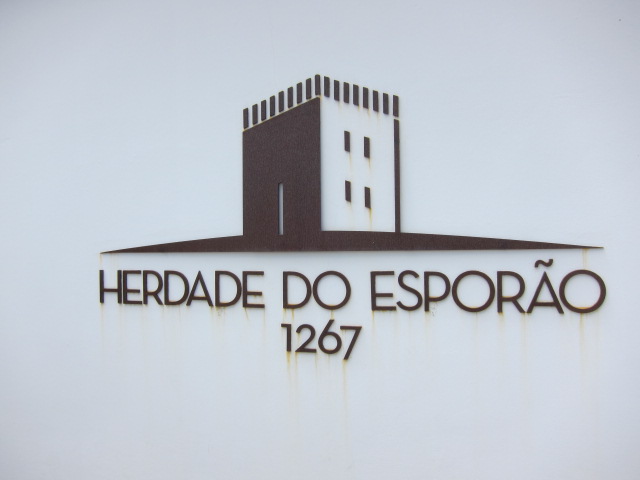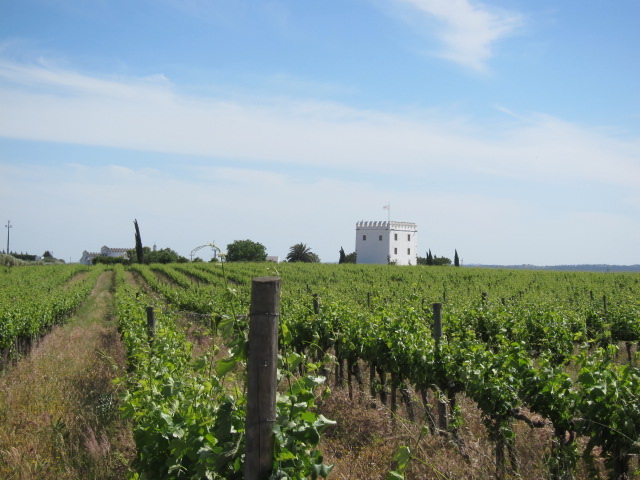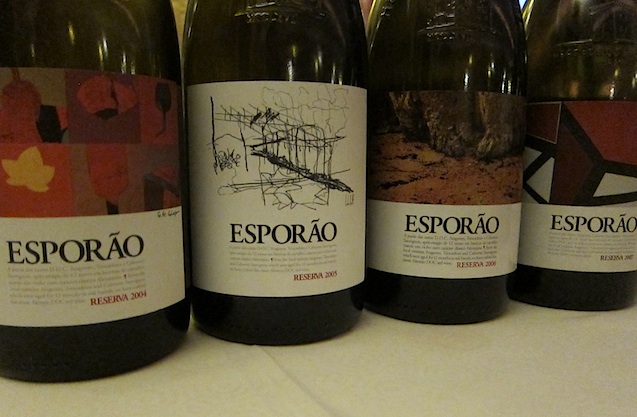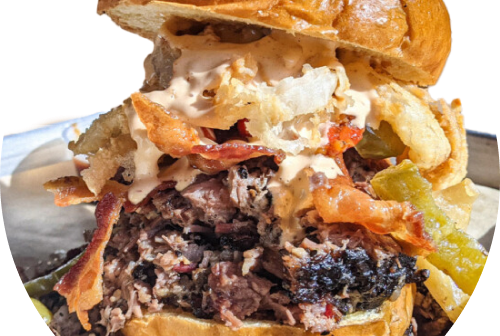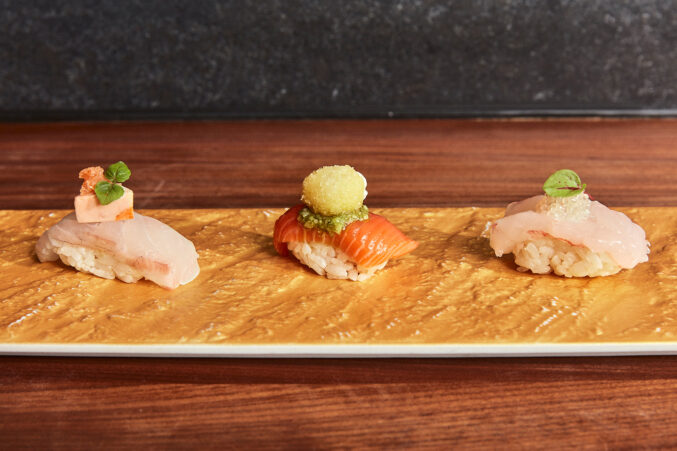When we think about wine from Portugal we think the obvious – Port, but so much more than the well loved fortified wine is coming out of this gorgeous, historic country filled with tradition, charm and gracious hospitality. I recently returned from traveling throughout the country with family owned Herdade Do Esporao as their guest to taste how they have transform the traditional Portuguese “field blend” of grapes grown in clay, schist and granite soils into robust, concentrated, teeth staining, terroir driven wines.
The original estate was founded in 1267 but acquired by José Roquette in 1973 to create his dream winery. A banker with a passion, his goal was to create a masterpiece winery from vines grown in the mineral rich, volcanic soils of the Alentejo region in South-East Portugal near the UNESCO historic, walled-in town of Evora, along with developing the now thriving olive oil business from estate grown trees. His dream came to a halt just a year later when the people of Portugal rose in revolution. The new government came to power and nationalized the land, along with much of the wealthy lands in the country, halting progress of the winery.
The situation lasted until the early 1980’s when José made a deal with the people to plant vineyards and grow grapes, giving part of the harvest to the community coop. At this time Esporao began replanting, pulling up unkempt vines and developing vineyards amongst the many acres of natural forests.
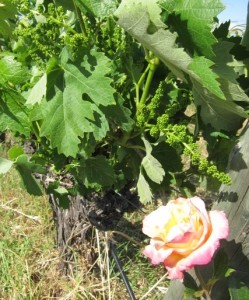 They also set their sites on the creation of the winery with a hope to eventually begin making their own wine. They maintained this relationship with the new government for the next few years, even making the first vintage of their own wine at the community coop. Finally, the new government agreed that their agreement could come to an end and Esporao was free to grow their grapes completely for themselves, and making their wine on their expansive 3700 acre Alentejo property which includes vines, olive trees, a massive water reservoir, as well as archeological monuments relating the ownership of the property dating back to 1267. The winery continues to move toward full sustainability, with an eye on the environment by keeping much of the natural habitat and forestry intact while encouraging biodiversity, with minimal use of pesticides, using solar energy and water conservation. This eye towards the environment is a key part of the work João Roquette, son of founder José Roquette, is focused on for the estate.
They also set their sites on the creation of the winery with a hope to eventually begin making their own wine. They maintained this relationship with the new government for the next few years, even making the first vintage of their own wine at the community coop. Finally, the new government agreed that their agreement could come to an end and Esporao was free to grow their grapes completely for themselves, and making their wine on their expansive 3700 acre Alentejo property which includes vines, olive trees, a massive water reservoir, as well as archeological monuments relating the ownership of the property dating back to 1267. The winery continues to move toward full sustainability, with an eye on the environment by keeping much of the natural habitat and forestry intact while encouraging biodiversity, with minimal use of pesticides, using solar energy and water conservation. This eye towards the environment is a key part of the work João Roquette, son of founder José Roquette, is focused on for the estate.
Not long after this time they also found their winemaker, David Baverstock, who now has been with the winery for almost 22 years. The winemaker, born and raised in Australia, had been in Portugal for a few years when he became a part of the Esporao family, working in both Port houses and traditional wine companies in the northern part of the country. When he met owner José Roquette they found their visions and philosophies meshed from the onset – Make high quality wine, expressing a true representation of the land in Alentejo, the country, and the company. Bonus, it is also quite affordable, making it accessible to a large community of wine lovers.

David found his way to Portugal early in his career, but not initially for wine – instead for love.
From the Barrosa region of Australia he had gone to Germany and France to work harvest and various winery jobs when he was just starting out (where he fell in love with varieties like Semillion, Marsanne and Roussanne – not traditional Portuguese varieties but the primary blend in the Esporao Private Selection) and visited Portugal on holiday. There, on a beach he met his true love. Not long after he returned to Australia she followed and 6 months later they were married. Missing her home they eventually moved to Portugal where today David is considered a master in the country, having won the “Best Winemaker of the Year” award for the second time recently at the Portuguese wine awards organized by publication: revista Wine. Conjunctly, Esporao is considered one of the most respected brands in Portugal and throughout the world, known for its quality, focus on sustainability and overall taste.
Though they have planted some non-traditional varieties, like the French varieties, as well as others like Syrah…again a favorite of the Australian winemaker, they mainly work with some of the over 250 different indigenous varieties identified in the country, including Touriga Nacional, Alicante Bouschet, Aragones (Tinto Roriz in Spain,) Arinto, and Antao Vaz. 201 different varieties are planted on the property, of which about 31 make up 95% of the wine they make. They also have created an extensive test vineyard with dozens of different, non-indigenous varieties planted to see how they may adapt to the Portuguese soils, climate, etc. for potential use in the future.
The wines can be enjoyed on their own, however these wines shine with food, especially the hearty dishes of the country like their roast lamb, rabbit stews, quail and partridge terrines, bread porridge, and thin shaved slices of salty, cured ham pairing perfectly with the robust, tannin filled red wines, or salty fish flavored by the sea, accompanied by bowls of olives and very green, spice and floral filled olive oils accentuating the minerality and herbal notes found in many of the white wines. Nothing goes to waste in Portugal, as it traditionally has not been a wealthy society. Meals are built around inexpensive cuts of meat or fish caught that day, cooked low and slow over hot fires with hearty vegetables like turnips, cauliflower and carrots for stews, while turnip greens are cooked down and incorporated into olive oil and potato filled soups. Simple, delicious, comfort food. Some chefs are taking these flavors and reinventing them into more refined bites and presentations. The best dish I had was a just caught octopus carpaccio lightly dressed in local olive oil and lemon, with a drizzle of fresh pesto made from herbs grown on-site, elevating the traditional flavors of the country, and pairing beautifully with Esporao 2 Castas White blend of two indigenous grapes, Arinto and Antao Vaz highlighting the brininess of the fish and the herbal notes of the dish. .
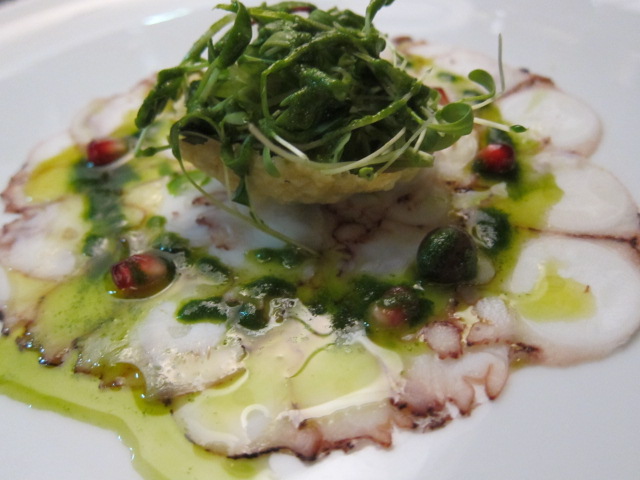
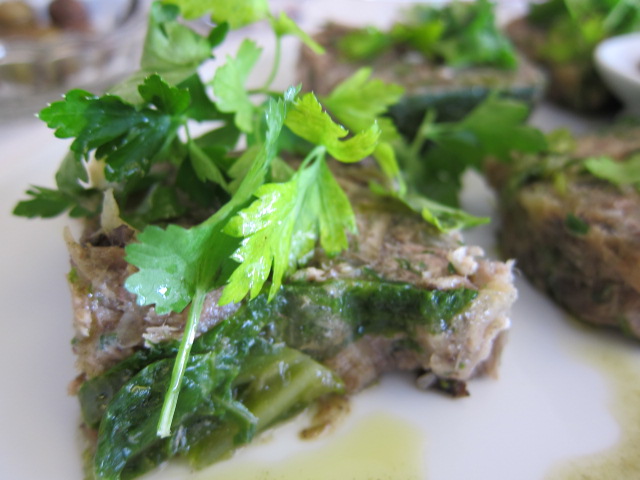
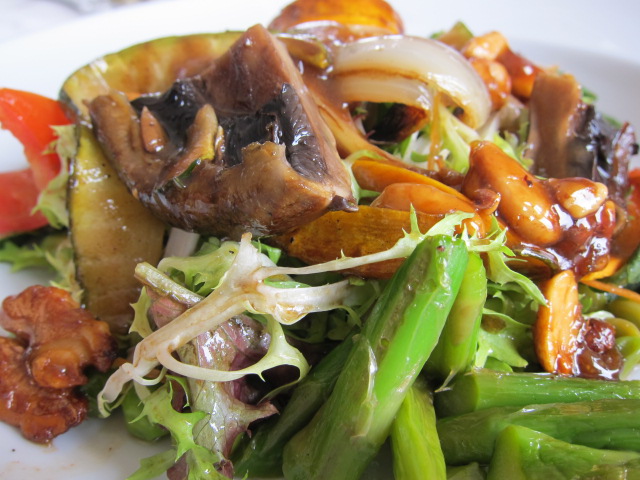
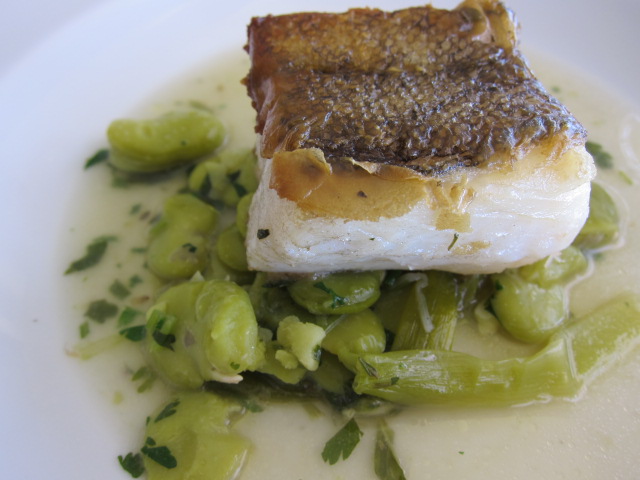
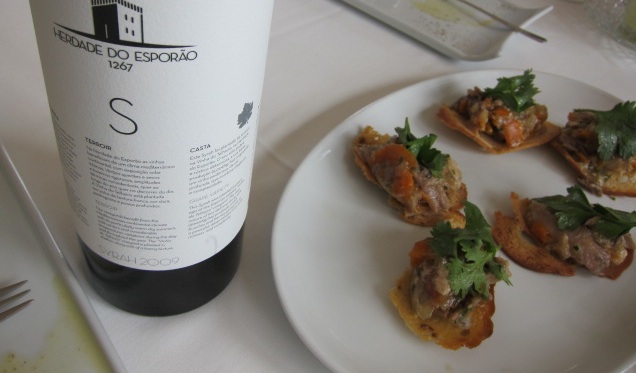
Esporao has several different brands within their portfolio, creating accessibility for a wide range of price points. Monte Velho, their introductory line, includes two wines all from fruit grown in Alentejo both on their estate and from vineyards throughout the region that the winery has long term contracts with – a white and a red. The Monte Velho white blends indigenous Roupeiro, Antao Vaz and Perrum to create a citrus and tropical fruit filled, light and bright white wine, retailing for around $13. The Monte Velho red blends Trincadeira, Aragones and Castelao together for a spicy plum and blackberry filled wine, also for around $13 a bottle, both available at Spec’s. Trincadeira tends to have low tannin and acid levels, while Aragones has high tannin levels, making them ideal blending partners.
The Esporao Reserva wines celebrate traditional Portuguese varieties, often blended with just a touch of Cabernet Sauvignon or Syrah to balance the flavors. The Esporao Reserva Red blends 100% estate grown Trincadeira, Aragones, Cabernet Sauvignon and Alicante Bouschet for an intense and flavorful wine with a deep garnet color, powerful ripe fruit, spice and chocolate aromas and flavors with firm tannins creating a complex and lengthy finish. This was my favorite red wine we tasted, and one I continued to revisit throughout trip both enjoying the current vintage as well as having a chance to taste a few previous vintages, proving how well this wine will age and soften over the next few years, allowing the bold tannins to become more subtle, lifting the elegance of the wine to the forefront. Retails for round $25 a bottle, available at select Spec’s locations.
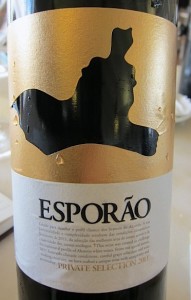 Esporao Private Selection white, though not made from indigenous Portuguese grapes, is a simply stunning white wine. Made from White Rhone varieties Marsanne, Roussanne and White Bordeaux Semillon, grown in the mineral rich soils of the hot Alentejo estate which gives way to cool evenings allowing full ripening of the fruit while maintaining balanced acidity levels. The wine opens with layers of white flowers and peach blossom with white peach, ripe pear and a touch of smoke and spice, rounding out to a creamy, lingering finish. Elegant and interesting, not the white wine I was expecting from Portugal, but one I am very excited to have discovered. Retails for around $30 a bottle.
Esporao Private Selection white, though not made from indigenous Portuguese grapes, is a simply stunning white wine. Made from White Rhone varieties Marsanne, Roussanne and White Bordeaux Semillon, grown in the mineral rich soils of the hot Alentejo estate which gives way to cool evenings allowing full ripening of the fruit while maintaining balanced acidity levels. The wine opens with layers of white flowers and peach blossom with white peach, ripe pear and a touch of smoke and spice, rounding out to a creamy, lingering finish. Elegant and interesting, not the white wine I was expecting from Portugal, but one I am very excited to have discovered. Retails for around $30 a bottle.
The Esporao Private Selection red blends two traditional Portuguese red varieties, Alicante Bouschet with Aragones for an intensely flavored, deep purplish red colored wine filled with layers of ripe red cherry, red berry and licorice flavors with hints of toasted spice and a slight smokiness. Retails for around $55 a bottle. Both Private Selection wines can be found at select Total Wines and More stores, as well as Grand Cru Wines and Gifts in Fort Worth and some Whole Foods locations.
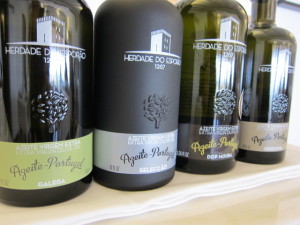 Another note, as delicious as these Esporao wines are, their fresh, very green, herbal, peppery olive oils just blew me away. The estate grows several different varieties, blending them to create their liquid gold which flavors everything from soups and salads, to simply roasted fish and beef, to accompanying one of the many moist, chewy inside/crunchy, toasted outside loaves of locally made rustic breads, also some of the best I have tasted. Select Spec’s stores and some Whole Foods locations carry a selection of their olive oils, or the oils can be ordered online through Murray’s Specialty Stores.
Another note, as delicious as these Esporao wines are, their fresh, very green, herbal, peppery olive oils just blew me away. The estate grows several different varieties, blending them to create their liquid gold which flavors everything from soups and salads, to simply roasted fish and beef, to accompanying one of the many moist, chewy inside/crunchy, toasted outside loaves of locally made rustic breads, also some of the best I have tasted. Select Spec’s stores and some Whole Foods locations carry a selection of their olive oils, or the oils can be ordered online through Murray’s Specialty Stores.


